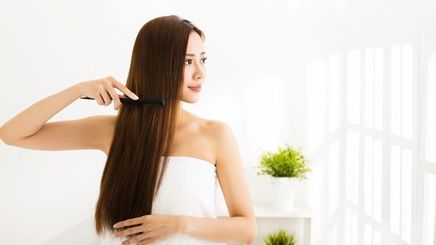
Whether you’re struggling with or would like smoother locks, a hair rebonding treatment would be a good choice. But while it does accomplish the near-impossible task of keeping rebellious strands manageable every single day, it does do a number on your hair health. Here are some ways hair rebonding can affect the hair and some stylist-approved tips to care for your sleek new look.
What Is Hair Rebonding?
Hair rebonding is a chemical treatment that changes your hair’s natural structure to give it a smoother and straighter appearance. It breaks down amino acids between bonds and rebuilds them to permanently change the structure of your hair. As a result, rebonding lasts longer than other treatments and is one of the most effective hair straightening treatments available.
How Hair Rebonding Works on Different Hair Textures
Hair rebonding generally works on all hair textures, according to senior creative stylist Victor Illagan. “Rebonding is a treatment that can restructure any hair type. The difference lies in how the hair is rebonded. For instance, extremely will benefit from straight rebonding, which smoothens the strands,” he says.
On the other hand, soft rebonding straightens your hair in the same way but uses milder chemicals and lower heat. Frizzy hair that’s slightly damaged can benefit from this type of rebonding because it gives the same smoothening effect with a milder treatment process.
Ask your stylist to check if your hair type and texture can withstand hair rebonding. “Clients who want a smoothening treatment instead of iron-straight hair can choose from other options like a treatment or Brazilian blowout,” Vic advises.
Unlike hair rebonding, which uses a more aggressive approach to straightening, keratin works on smoothening your hair and strengthening its bonds. The latter is better suited for dry and .
How to Make Your Treatment Last
Keep your newly-rebonded hair looking salon-fresh by taking some precautions and adjusting your routine. “To extend your treatment, wait two to three days before washing your hair. Avoid swimming in chlorinated water or when bathing. Finally, since rebonding can make your hair weak, protect your hair from by getting regular trims,” Vic advises.
Combat dryness and frizz.
One of the most common side effects of getting a hair rebonding treatment is . Hair that’s may require more frequent touch-ups.However, your hair can show curly or wavy regrowth after some time, in which case you can get a touch-up or allow your hair to grow out.
Maintain your sleek, straight hair with Vitakeratin Treatment Deep Repair. The product is infused with vitamin E and to give your hair the daily nourishment it needs to keep it from getting brittle.
Don’t use damaging hair accessories or wear tight hairstyles.
Another issue caused by hair rebonding is . The slightest pull or tug on your strands can cause breakage since the chemicals in the treatment can weaken the hair shaft. To address this, avoid styling your hair in , and use soft accessories such as scrunchies or ribbons. Steer clear of the treatment altogether if you have thin or if you’re prone to hair fall.
Who Cannot Undergo Hair Rebonding?
Although hair rebonding will work on all hair textures, it's not for everyone. “Pregnant women should not have their hair rebonded because of the chemical components involved in the process. The smell can be harsh and nauseating,” Vic says.
He adds that people who’ve had chemical treatments should not undergo hair rebonding. “Hair that has will break if rebonded. In such cases, hair acts like rubber and will not withstand a treatment that will destroy its elasticity,” Vic adds.
Thankfully, you have non-chemical options to smoothen the hair. Try Sunsilk Expert-Perfect Straight Shampoo with Straight Lock Technology to help keep your hair straight and . Lock in moisture with Cream Silk Treatment Keratin Rebond Straight, which conditions your tresses deeply to repair damage and boost smoothness and shine.
Rebonding your hair may come with a few issues, but the result is less styling time and waking up with smooth, poker-straight hair — which, frankly, sounds amazing! Work with your hairstylist to determine if hair rebonding is for you and have a post-treatment plan to maintain hair health.